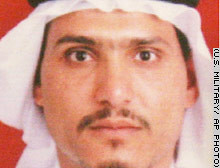The U.S. military on Thursday revealed for the first time a photo of the man said to be the new leader of al Qaeda in Iraq.
The military said the picture showed Egyptian-born Abu Ayyub al-Masri, a senior al Qaeda in Iraq operative believed to have taken over the terror network after the killing of Abu Musab al-Zarqawi last week.

The Defense Intelligence Agency declassified the photograph on Wednesday at the U.S. military's request, said U.S. military spokesman Maj. Gen. William Caldwell at a news conference in Baghdad, adding that he had no idea how the DIA got the photo.
ReplyDeleteAl-Masri "has been a terrorist since about 1982, beginning with his involvement in the Egyptian Islamic Jihad, which was led by Zawahiri," said Caldwell. Ayman al Zawahiri is al Qaeda leader Osama bin Laden's top deputy.
Caldwell described al-Masri as "an explosives expert, specializing in the construction of vehicle-borne improvised explosive devices." He also said al-Masri spent time training with terrorists in Afghanistan starting in 1999.
After U.S. forces ousted Afghanistan's Taliban regime in late 2001, al-Masri began to work with al-Zarqawi in Falluja "and then later became, we think, basically the emir of southern Iraq" for the group, Caldwell said.
Al-Masri's "intimate knowledge" of the terrorist network will help al Qaeda in Iraq "regain some momentum if, in fact, he is the one that assumes the leadership role," Caldwell said.
The military believes al-Masri is also known as Sheikh Abu Hamza al-Muhajer, who was named last week as al-Zarqawi's replacement on a Web site used by al Qaeda in Iraq, Caldwell said.
"We'll continue to do further analysis," Caldwell added, noting that a power struggle may still be under way inside al Qaeda in Iraq.
Caldwell defended the military's release of al-Masri's photograph, saying that "a lot of discussion" occurred on senior levels about whether to release it and "our intent is not to glorify him or make him more important."
A standard $250,000 reward for information leading to al-Masri's death or capture is still in effect and was in force before al-Zarqawi's death caused by a U.S. airstrike last week, said Caldwell.
Iraq reveals 'al Qaeda plans'
Recently seized documents that led to al-Zarqawi's death also revealed the hideouts and names of other al Qaeda in Iraq leaders and could destroy the terror network, Iraq's national security adviser said Thursday.
"Al Qaeda is on the run now in Iraq, and this is the beginning of the end of al Qaeda in Iraq," Mowaffak al-Rubaie told CNN.
The documents, he said, were found on a "thumb drive" memory card with 1 gigabyte of memory and represented "a trove of information ... a treasure of data." The discovery was among many made during an ongoing operation that began before the June 7 airstrike that killed al-Zarqawi.
At an earlier news conference, al-Rubaie cited the documents as saying al Qaeda in Iraq considered its situation in Iraq "bleak" and was planning to exacerbate already hostile tensions between Iran and the United States.
Such plans included the delivery of threatening messages attributed to Shiite Iranians and the carrying out of attacks under the guise of Iranian collusion, the Iraqi government cited the documents as saying.
Al Qaeda in Iraq also considered planting information that Iran has ties to terror groups, has been in possession of weapons of mass destruction, and is attempting to carry out terror operations in the West, the documents said, according to the Iraqi government.
CNN cannot independently verify the authenticity of the documents.
Iraq violence
Violence across Iraq left 28 people dead and 30 wounded Thursday, police said.
In separate incidents, gunmen killed 10 minibus passengers in western Baquba and a factory worker southwest of the capital, police said. Gunmen were also behind the storming of the Sunni al-Imam Muslim bin Aqil mosque northeast of Tikrit, where they killed four people and wounded 16 others, authorities said.
In southwestern Baghdad, a car bomb exploded outside a bakery around 8 p.m., killing three people and wounding 14, police said.
A pair of roadside bombs struck an Iraqi army patrol in central Tal Afar, killing three Iraqi soldiers and damaging an Iraqi army vehicle, a Mosul police official said.
In addition, seven bullet-riddled bodies were found in various Baghdad neighborhoods on Thursday, in spite of the second day of a security crackdown in the capital, police told CNN. They showed signs of torture and couldn't be immediately identified.
Other developments
The number of U.S. service members killed in Iraq has reached 2,500, the Pentagon announced on Thursday. White House spokesman Tony Snow called the number "a sad benchmark," saying, "One of the things the president has said is that these people will not die in vain."
U.S. and Iraqi forces have detained 759 "anti-Iraqi elements" and killed more than 104 in raids carried out since al-Zarqawi's death, said Caldwell, the U.S. military spokesman. Of the 452 operations that were carried out, 143 were conducted by Iraqi forces acting alone, Caldwell said.
CNN's Jennifer Z. Deaton, Mohammed Tawfeeq, John Vause, Cal Perry and Barbara Starr contributed to this report.